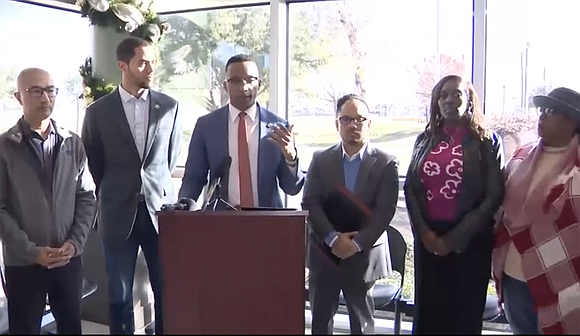Houston Rallies Against Industrial Giant: A United Stand for Health Over Concrete
Francis Page Jr. | 2/12/2024, 12:32 p.m.

In the shadow of the LBJ Hospital in Houston, a battle against environmental injustice is being waged. Harris County Attorney Christian D. Menefee's assertion rings clear: "You don’t put a facility that crushes concrete, that pollutes the air, just across the street from a hospital." This powerful statement leads a chorus of community leaders, healthcare professionals, and citizens rallying against the TCEQ's decision to authorize a concrete crushing facility that could jeopardize the health of countless Houstonians and erode the $2.5 billion bond investment in the city's healthcare infrastructure.
Dr. Esmaeil Porsa, President and CEO of Harris Health System, echoes this sentiment, questioning the legislative failure to protect hospitals and their vulnerable populations from such industrial threats, "It is obvious that putting a concrete crushing plant literally across the street from a Level 3 Trauma Center hospital—LBJ Hospital—makes no sense." The proposed facility, perilously close to the hospital and vital community spaces, poses a threat of pollution in a district already facing the challenges of environmental racism, marked by health disparities and diminished life expectancies.
Dr. Porsa also addressed the paradox in the state's protective regulations, questioning the absence of healthcare facilities from the list of protected entities. "Over the last few months, I have learned that the creation of a concrete crushing plant such as proposed here, close to residences, places of worship, and schools, is prohibited by Texas law," he noted. "I have wondered why not hospitals? Why aren't hospitals included in that law, like places of worship and schools, where people gather together a few times a week?"
Amid these potent declarations, Chris Hollins, City Controller for the City of Houston, adds a tertiary but critical perspective to the discussion, tying environmental stewardship to the city's fiscal health: "The true cost of this is human life," Hollins stresses, highlighting the intrinsic value of community well-being over financial considerations. He stands in solidarity with the community at the hospital, "one of the few places that folks in the community, especially those without insurance... can come," now facing the specter of a harmful neighbor.
Hollins delves deeper into the financial impact, elucidating why a figurehead of the city's finances would be deeply concerned with an environmental issue: "These types of environmental issues have significant financial implications," he reveals. His insight into the Council's recent financial maneuvers, redirecting millions to relocate citizens from toxic environments, underscores the broader costs of environmental negligence.
As the LBJ Hospital stands on the brink of expansion into a Level 1 Trauma Center, the community's call to action grows ever louder, seeking Governor Greg Abbott's intervention and imploring TCEQ to reconsider their decision.
Houston Style Magazine stands with the voices of Harris County, advocating for a future where the sanctity of public health and healthcare sanctuaries is not sacrificed on the altar of industrial progress. This is not just a local issue; it is a narrative of resilience, a fight for justice, and a reflection of Houston's indomitable spirit. The community's resolve is unyielding, their voices a testament to the city's unwavering commitment to protect its citizens and their right to a healthy environment.
NOTE - TO FILE YOUR COMPLAINT: If you need to file a complaint with the Texas Commission on Environmental Quality (TCEQ), there are several methods available to you:
• Email: You can send your complaint to complaint@tceq.texas.gov.
• Phone: For general complaints, call toll-free at (888) 777-3186.
• Online Form: Complaints can be submitted using the TCEQ’s online complaint form. The form and additional instructions can be found on their Report an Environmental Problem page.
• Mail: You can also send your complaint via regular or certified mail to the following address:
• TCEQ
• P.O. Box 13087
• Austin, TX 78711-3087
Please include a contact name and mail code when addressing your mail. If sending documents by express carrier, they should be sent to 12100 Park 35 Circle, Austin, TX 78753, with the appropriate building letter and contact name.
For specific types of complaints, such as those related to odors, you may need to provide additional information or follow specific procedures as outlined on the TCEQ website.
Before submitting a complaint, it's important to gather and provide accurate information regarding the date, time, location, and nature of the issue, as well as any relevant details about the potential source. Providing contact information is optional but recommended, as it allows TCEQ to follow up if additional information is needed or to inform you of the outcome.
For more details and to ensure you follow the correct procedure, please refer to the TCEQ's official Contact Us page and their guidance on How to Make an Environmental Complaint.







